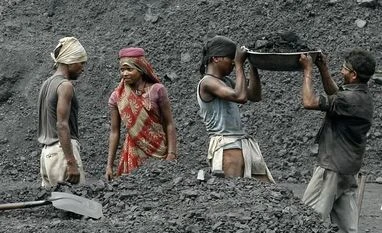Thermal coal imports at the country's 12 major ports declined 14.98 per cent to 74.60 million tonnes (MT) during April-January this fiscal, as per a report by the Indian Ports Association.
The Centre-owned ports had handled 87.74 MT of the dry fuel in the same period of the previous year.
The Indian Ports Association (IPA), which maintains cargo data handled by these 12 ports, in its report said "percentage variation from previous year" in thermal coal handling was at 14.98 per cent.
Imports of coking and other coal recorded a rise of 1.10 per cent at 47.08 MT during the period. These ports had handled 46.57 MT of coking coal in the corresponding period last fiscal.
Thermal coal is the mainstay of India's energy programme as 70 per cent of power generation is dependent on the dry fuel, while coking coal is used mainly for steel-making.
India is the third-largest producer of coal after China and the US and has 299 billion tonnes of resources and 123 billion tonnes of proven reserves, which may last for over 100 years.
More From This Section
India has 12 major ports -- Kandla, Mumbai, JNPT, Marmugao, New Mangalore, Cochin, Chennai, Kamarajar (Ennore), V O Chidambarnar, Visakhapatnam, Paradip and Kolkata (including Haldia) which handle approximately 61 per cent of the country's total cargo traffic.
These ports recorded a marginal 1.14 per cent growth in total cargo volumes at 585.72 MT during April-January period of the current fiscal.
The ports had handled 579.10 MT of cargo during the corresponding period of the last fiscal.
While the handling of thermal coal shipments declined 14.98 per cent to 74.60 MT, iron ore saw 39.02 per cent jump to 45.05 MT during the period, the IPA data showed.
The 12 ports had handled 32.37 MT of iron ore during April-January period of the previous fiscal.
Finished fertiliser volumes jumped 21.55 per cent but raw fertiliser volumes dipped 2.80 per cent.
Containers recorded a growth of 2.65 per cent in terms of TEUs (twenty-foot equivalent units).
According to the figures, Deendayal port handled the highest traffic volume at 101.96 MT during April-January 2019-20, followed by Paradip at 93.38 MT, Visakhapatnam at 60.73 MT, JNPT at 56.64 MT, Kolkata (including Haldia) at 53 MT, and Mumbai at 51.34 MT.
Chennai port handled 39.80 MT of cargo, while New Mangalore handled 30.91 MT.
The volume of seaborne cargo is essentially in the nature of derived demand and is mainly shaped by the levels and changes in both global and domestic activity.
)